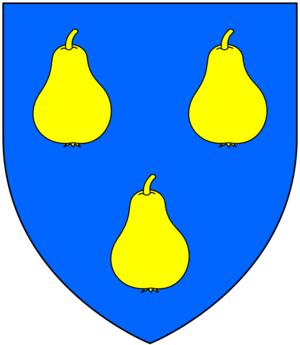Lewis Stukley facts for kids
Sir Lewis Stucley (1574–1620) was a powerful landowner, known as the lord of Affeton in Devon, England. He also held an important naval position as the Vice-Admiral of Devonshire. Sir Lewis Stucley is mostly remembered for his role in the final days of the famous explorer, Sir Walter Raleigh. At the time, many people admired Raleigh, and Stucley became unpopular, earning the nickname "Judas" Stucley.
Contents
Who Was Sir Lewis Stucley?
Sir Lewis Stucley was the oldest son of John Stucley, who was also the lord of Affeton. His mother was Frances St Leger. His grandfather, Lewis Stucley, had a famous brother named Thomas Stucley. Thomas was a soldier who fought for money, and he died in a big battle called the Battle of Alcazar.
Sir Lewis's Career and Duties
King James I made Lewis Stucley a knight in 1603. This was a great honor. Later, in 1617, Sir Lewis was given the job of being the guardian for Thomas Rolfe. Thomas was the two-year-old son of John Rolfe and Rebecca, also known as Pocahontas. Sir Lewis later passed this responsibility to Thomas's uncle, Henry Rolfe.
In 1618, Sir Lewis Stucley bought the important job of Vice-Admiral. This meant he was in charge of naval matters in Devon. Soon after, he became involved in a very important political situation involving Sir Walter Raleigh.
The Arrest of Sir Walter Raleigh
In June 1618, Sir Lewis Stucley was given a special task by King James I. He had to deal with Sir Walter Raleigh, who was returning to Plymouth after an expedition to Orinoco. Raleigh had broken a peace treaty between England and Spain, which caused a big problem for the King.
Sir Lewis was told to arrest Raleigh. He met Raleigh in Ashburton and brought him back to Plymouth. While waiting for more orders, Raleigh tried to escape to France, but he was caught and brought back. Stucley then sold the tobacco that was on Raleigh's ship.
Sir Lewis was instructed to treat Raleigh well because Raleigh was not in good health. They began their journey from Plymouth on July 25. Raleigh traveled with his wife and son. One of Stucley's companions was a French doctor. They reached Salisbury on July 27.
At Salisbury, they stopped for a while. Raleigh pretended to be sick to gain time. He used this time to prepare his defense for the King. Raleigh even tried to offer Stucley a bribe, but Stucley refused it. On August 1, they continued their journey.
Raleigh in London and His Escape Attempt
By the time they reached Andover, Stucley realized Raleigh was planning to escape. He kept a closer watch on him. Stucley also pretended to be on Raleigh's side to trick him.
On August 7, they arrived in London. For a short time, Raleigh was allowed to stay at his wife's house. He claimed he was too ill to be imprisoned. Raleigh then tried to escape by boat on the River Thames on August 9. However, Stucley was part of a plan to trick Raleigh. Stucley helped Raleigh get into a small boat, but they were soon caught by a larger boat. Stucley then arrested Raleigh again in the King's name.
Raleigh's Execution and Stucley's Reputation
After this escape attempt, Raleigh was put in the Tower of London. He was executed on October 29. The reason given was an old charge of high treason from 1603. On the day of his execution, Raleigh gave a final speech. He mentioned Stucley, saying he forgave him.
Stucley had given evidence against Raleigh. This caused a huge public outcry. People believed Stucley had a long-standing grudge against Raleigh. It was even rumored that Stucley wanted Raleigh to escape just so he could catch him again and get more credit.
The King himself commented on the situation, saying that if he were to punish everyone who spoke badly of Stucley, there wouldn't be enough trees for hangings.
Public Opinion and Stucley's Defense
After Raleigh's death, a writer named Robert Tounson defended Raleigh. Even though Raleigh said he forgave everyone, he still called Stucley "perfidious," meaning untrustworthy.
Sir Lewis Stucley tried to defend his actions. He published two documents: an Apology and a Petition. These documents explained his side of the story. The King's officials also published a document defending the King's actions.
Later Life and Death
People continued to call Stucley "Judas." In 1619, Stucley and his son were accused of a crime called "clipping coin." This meant illegally cutting small pieces off gold coins. The coins involved were a large sum of money Stucley had received for his work with Raleigh. Many people thought this money was "blood money," meaning it was gained through betrayal.
The King eventually pardoned Stucley. However, public hatred followed him. He fled to the island of Lundy, where he died in 1620. It was rumored that he died in a state of madness.
Sir Lewis Stucley's Family
In 1596, Sir Lewis Stucley married Frances Monck. She was the aunt of a very famous general, George Monck, 1st Duke of Albemarle. Sir Lewis and Frances had six sons and one daughter. Many people at the time thought Raleigh and Stucley were related, but they were not.


